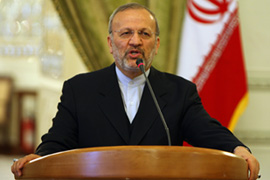Tehran says nuclear talks possible
Statement marks apparent reversal of Iran’s refusal to discuss nuclear programme.

“… as the president [Barack Obama] has said, if Iran responds to our interest in a meeting, we’ll see when that can occur. We hope that will occur as soon as possible.”
Direct talks with Iran could lessen immediate pressure on President Obama to abandon his attempts to engage with Tehran, which critics say has yet to yield concrete results.
Limiting production
Obama said in July that Iran should show a willingness to negotiate limits on its nuclear programme by September, or face consequences.
“Clearly, if Iran refuses to negotiate seriously, we – the United States and the international community and the Security Council – can draw conclusions from that. And then based on that, we’ll make some judgments in the future,” Crowley said.
|
“Clearly, if Iran refuses to negotiate seriously, we – the United States and the international community and the Security Council – can draw conclusions from that” Philip Crowley, US state department spokesman |
In its proposal, Iran ignored a demand by the six world powers for a freeze of its uranium enrichment, which critics say could lead to the production of a nuclear weapon.
Gareth Porter, an independent historian and journalist, said that Iran’s proposal still provided some scope for discussion on its nuclear activity.
“It does not mean that they’re not going to talk about the nuclear issue,” he told Al Jazeera.
“On the contrary, there is a piece of the proposal that they have put forward which alludes to the rights of states with regard to advanced technology.
“That is the rubric under which they clearly intend to discuss the whole subject of their nuclear programme.”
Soon after the US comments, Manouchehr Mottaki, Iran’s foreign minister, said that the US and others had acknowledged “that our package has major topics for holding constructive negotiations”.
“We hope that they address our package seriously, deeply and analytically,” he said.
He also appeared to step up his country’s proposal, saying that “should conditions be ripe, there is the possibility of talks about the nuclear issue”.
‘Pointless paths’
Iran insists that its nuclear work is strictly for peaceful non-military purposes.
Ahmad Vahidi, Iran’s defence minister, reiterated on Saturday Tehran was not planning to develop an atomic bomb.
 |
| Mottaki appeared to extend Iran’s proposal to discussion of the nuclear issue [AFP] |
“We regard production of weapons of mass destruction as contrary to our religious, human and national principles,” the Fars news agency quoted Vahidi as saying.
“Manufacturing nuclear weapons is not, and has never been, on our agenda.”
ProPublica, a US non-profit investigative journalism group, said earlier that it had obtained a copy Iran’s proposal, which states the areas for negotiation as political-security issues, international issues and economic issues.
“The Iranian nation is prepared to enter into dialogue and negotiation in order to lay the ground for lasting peace … and beyond and for the continued progress and prosperity of the nations of the region and the world,” the document, published on ProPublica’s website, said.
The proposal also advises that “not insisting on futile and pointless paths that have proven to be of no avail is the prerequisite for success in the upcoming negotiations”.
Iran pronounced itself ready to “embark on comprehensive, all-encompassing and constructive negotiations”.
The decision to take up Iran’s offer was communicated publicly on Friday in Brussels, by Javier Solana, the European Union foreign policy chief, who is an intermediary for the six powers.